ChatGPT Written Content Detection
ChatGPT is a state-of-the-art artificial intelligence language model, designed to understand and generate human-like text. This powerful AI has made significant advancements in natural language processing, offering a wide range of applications beyond simple chatbots.
The integration of AI, like ChatGPT, into research processes has revolutionized the way scholars and scientists approach their work. It accelerates data analysis, provides insights, and aids in literature review, ultimately enhancing productivity and the quality of research outcomes.
This blog post aims to explore the utility of ChatGPT in research paper writing. By the end of this post, you’ll have a clearer understanding of how to harness this AI for your research endeavors.
Benefits of Using ChatGPT for Research Papers
Time-saving: ChatGPT can expedite various aspects of research, such as content drafting, data analysis, and literature review. This time-saving aspect allows researchers to allocate more of their efforts to higher-level tasks, such as data interpretation and critical thinking.
Enhanced productivity: By automating routine and time-consuming tasks, ChatGPT boosts researchers’ productivity. It can quickly generate content, answer queries, and provide valuable insights, thereby allowing researchers to accomplish more within the same timeframe.
Improved research quality: ChatGPT can assist in refining research questions, identifying potential pitfalls, and suggesting enhancements to the study design. This contributes to improved research quality by reducing errors, ensuring logical flow, and refining the research focus.
Assistance in literature review: ChatGPT is a valuable tool for streamlining the literature review process. It can summarize and synthesize relevant research articles, helping researchers stay up-to-date with the latest findings and ensuring a comprehensive and well-informed literature review.
Content generation: ChatGPT can assist in generating content for research papers, including introductions, conclusions, and even sections of the paper.
Data interpretation: ChatGPT can help in interpreting data by explaining statistical results and suggesting potential insights. It aids researchers in understanding the implications of their findings and enhances the clarity of data-driven research.
Reduced writer’s block: Researchers often encounter writer’s block when working on complex papers. ChatGPT can provide inspiration and help overcome writer’s block by generating ideas and content that researchers can build upon.
Steps involved in writing a research paper
There are several steps in writing a Research Paper. First we will go broadly through them, followed by how we can use ChatGPT for Research Paper.
- Selecting a Research Topic
- Conducting a Literature Review to Identify gaps, controversies, or areas where further investigation is needed.
- Defining Research Questions or Hypotheses
- Plan Research Methodology involving experiments, surveys, case studies, or data analysis.
- Data Collection as per your research design.
- Data Analysis using appropriate statistical or qualitative methods. Interpret the results and draw conclusions.
- Organizing Your Paper: Structure research paper with sections like Title, Abstract, Introduction, Literature Review, Methodology, Results, Discussion, Conclusion, and References.
- Writing the Introduction
- Literature Review: Summarize and analyze relevant research from the literature.
- Research Methods: Describe your research methods, including data collection and analysis.
- Present your research findings in a clear and organized manner.
- Interpret the results and discuss their implications, compare your findings to existing research.
- Conclusion
- Citations and References
- Proofreading and Editing
- Peer Review for feedback and suggestions.
- Final Revisions & Submission
Ways of Using ChatGPT For Research Paper
Selecting a Research Topic
ChatGPT can help brainstorm ideas and suggest potential research topics based on your interests and keywords. It can assist in narrowing down broad topics to specific research questions.
Here are a few prompts that you can use for topic research using ChatGPT
“Can you suggest research topics related to [your field or area of interest]?”
“I’m interested in [a general area], can you provide specific research topics within this domain?”
“I’m looking for research ideas that address [a specific problem or issue] in [your field].” Or “Can you help me narrow down my research topic related to [your field] by suggesting specific research questions or areas of focus?”
“What are the most pressing research challenges in [your field] that require further investigation?”
“Suggest research topics that involve interdisciplinary approaches, combining [two or more fields].”
“What are some unexplored research areas in [your field] where I can make a significant contribution?”
Conducting a Literature Review
ChatGPT can assist in searching for and summarizing relevant research articles and papers on your chosen topic. It can help you identify key studies, trends, and gaps in the literature.
Either you can use OpenAI powered tools like ChatPDF to summarize long papers or Merlin to read and summarize articles.
Searching for Relevant Research Articles: ChatGPT can help you identify relevant research articles and papers by suggesting appropriate keywords, search terms, and specific databases. For example, if your research is about the impact of social media on mental health, you can ask ChatGPT:
“What are the key databases or journals I should search for articles related to the impact of social media on mental health?”
“I’m conducting a literature review on the impact of social media on mental health. Can you help me find relevant articles and summarize their key findings?”
ChatGPT might suggest databases like PubMed, PsycINFO, and specific journals where such research is often published.
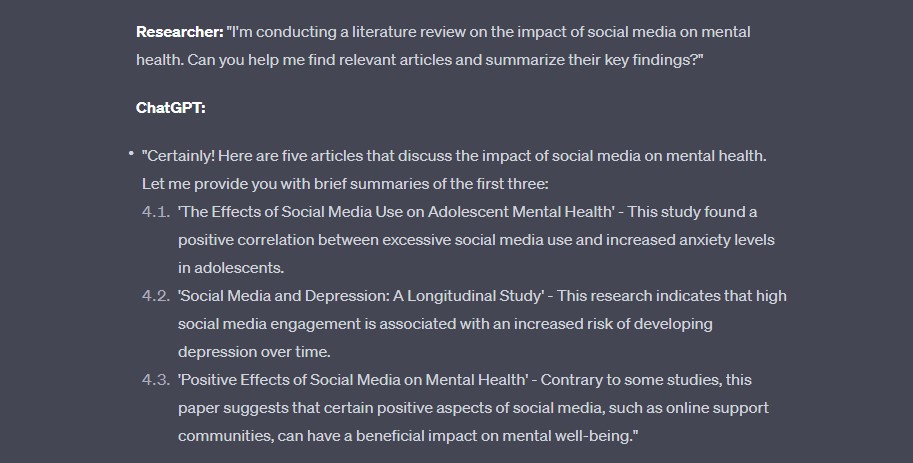
Summarizing Existing Research: Once you have collected a list of potential articles, you can ask ChatGPT to summarize these articles briefly. For example:
“Can you provide summaries of the three most relevant articles on the impact of social media on mental health?”
ChatGPT can generate concise summaries that help you quickly grasp the key findings and methodologies of these papers.
Identifying Key Studies and Trends: ChatGPT can assist in identifying key studies in your research area. You can ask,
“What are the seminal studies in the field of [your topic]?” or “Can you identify the most cited papers in [your field] related to [your topic]?”
ChatGPT can highlight the studies that have had a significant impact on the field and explain why they are influential.
Identifying Gaps in the Literature: To identify research gaps, you can ask ChatGPT questions like,
“What are the current research gaps in the study of [your topic]?”
Or
“Can you suggest areas within [your topic] where more research is needed?”
ChatGPT can analyze existing literature and suggest areas that have received less attention or require further exploration.
Defining Research Questions or Hypotheses
ChatGPT can help refine and formulate research questions or hypotheses based on your initial ideas. It can provide guidance in making your research questions specific and researchable.
Clarifying Broad Ideas: If you have a general research topic in mind but are struggling to formulate specific research questions, you can provide ChatGPT with your broad idea. For example, if your general topic is “Climate change impact,” you can ask,
“Can you help me formulate specific research questions related to the [Your Topic]?”
“I’m interested in studying the impact of technology on education. Can you help me formulate specific research questions for my study?”
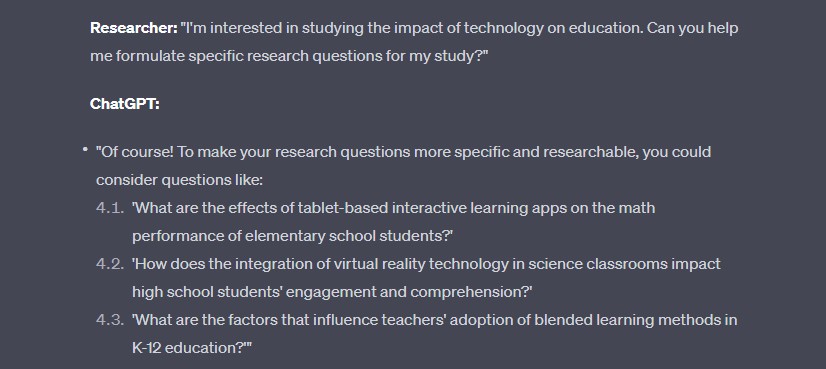
Narrowing Down the Scope: ChatGPT can assist in narrowing the scope of your research. For instance, if you’re interested in climate change’s impact on agriculture, you can ask,
“”How can I narrow down my research focus within the impact of climate change on agriculture?”
Suggesting Hypotheses: If your research involves hypotheses, you can ask ChatGPT for guidance in formulating them. For instance,
“”Can you suggest hypotheses related to the effects of air pollution on children’s respiratory health?”
Refining Research Questions: You can present ChatGPT with preliminary research questions and ask for suggestions to make them more specific and researchable. For example, if your initial question is, “How does technology affect student learning?” you can ask,
“How can I make this research question more specific and focused on a particular aspect of technology in education?”
Designing the Research
ChatGPT can provide information and guidance on research methodologies, helping you choose the most appropriate methods for your study.
Methodological Advice: ChatGPT can offer insights into various research methodologies, both quantitative and qualitative, explaining their advantages and disadvantages. For instance, if you’re uncertain about whether to use a survey or an experiment for your study, you can ask,
“What are the key differences between using a survey and an experiment as research methodologies?”
“I’m planning a research study on the impact of social media usage on mental health among teenagers. Can you provide guidance on the most appropriate research methodology for this study?”
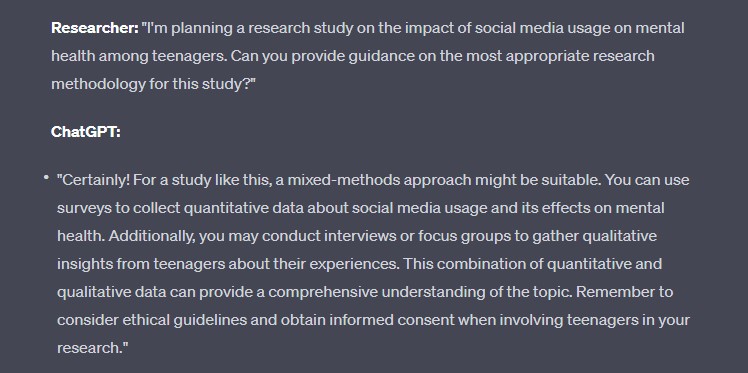
Sampling and Data Collection: ChatGPT can help you understand the intricacies of sampling techniques and data collection methods. It can guide you on how to select the right sample size, data sources, and data collection tools for your research.
Research Design: You can seek assistance in designing the overall research plan. If you’re unsure about the best approach, you can ask,
“What is the recommended research design for a study on [your research topic]?”
Data Collection
While ChatGPT itself doesn’t collect data, it can assist in creating surveys or interview questions, which you can use for data collection. It can also offer suggestions on how to ensure data accuracy and reliability.
Survey and Questionnaire Design: ChatGPT can help you design surveys or questionnaires for data collection. You can describe the information you need and ask,
“Can you assist in creating a survey for measuring [specific variables]?”
“I’m conducting a survey to gather data on consumer preferences for eco-friendly products. Can you help me design a questionnaire?”
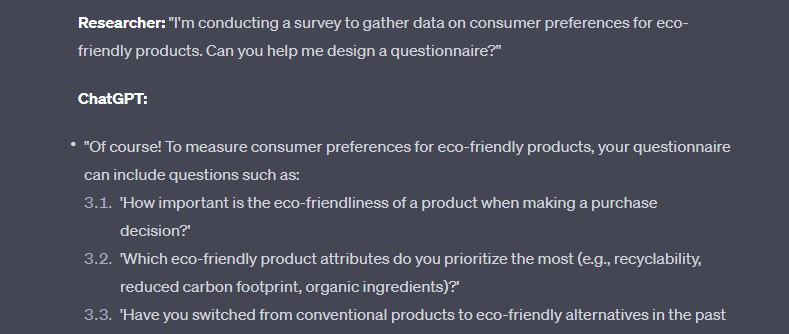
Interview Question Development: If your research involves interviews, ChatGPT can assist in formulating interview questions. For example, you can request help in creating open-ended questions for qualitative interviews.
“I’m conducting qualitative interviews with teachers to understand their experiences with remote teaching. Can you help me formulate interview questions?”
Data Validation and Accuracy: ChatGPT can provide suggestions on how to ensure data accuracy and reliability. It can recommend techniques for pilot testing surveys, conducting test-retest reliability, and minimizing measurement errors.
Data Analysis
ChatGPT can help explain statistical methods and results, making data analysis more accessible. It can assist in interpreting data and identifying patterns or trends.
Explaining Statistical Methods: ChatGPT can provide explanations of various statistical methods used in data analysis. For example, you can ask,
“Can you explain the concept of correlation analysis?” or “How does regression analysis work?”
Interpreting Statistical Results: ChatGPT can help interpret the results of statistical analyses. You can provide your data and ask questions like,
“What does the p-value in my regression analysis results indicate?” or “How do I interpret the coefficient values in my logistic regression model?”
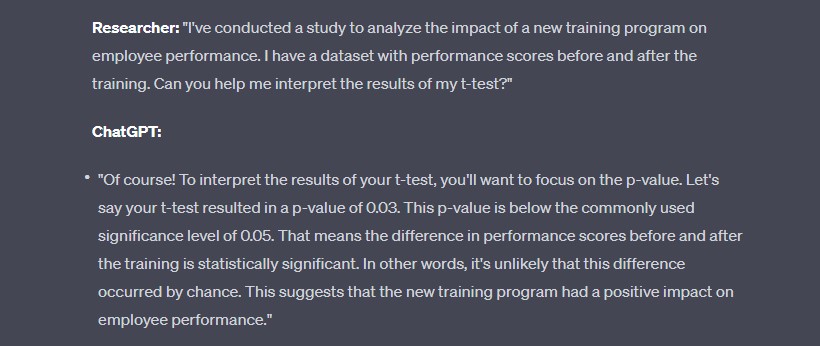
Identifying Patterns and Trends: ChatGPT can assist in identifying patterns or trends in your data. For instance, you can provide a dataset and ask,
“Are there any notable patterns or trends in this data that I should be aware of?”
Organizing Your Paper
ChatGPT can help structure your paper, providing templates for the title, abstract, introduction, methodology, results, discussion, and conclusion sections. It can also generate section headings and subheadings.
Writing the Introduction
ChatGPT can assist in writing the introduction by providing background information on your topic, discussing its significance, and framing your research questions.
Background Information: ChatGPT can provide concise yet informative background information related to your research topic. This may include historical context, key concepts, or relevant theories.
For example, if your research is on the impact of climate change on coastal ecosystems, you can ask,
“Can you provide background information on the effects of climate change on coastal ecosystems?”
Significance of the Topic: ChatGPT can help explain why the chosen topic is significant or relevant. You can ask it to provide insights into why your research matters.
For instance,
“Can you explain why studying climate change’s impact on coastal ecosystems is important?”
Framing Research Questions: ChatGPT can assist in framing research questions that capture the essence of your study. It can help make your questions clear, specific, and researchable. For example,
“Can you help me formulate research questions related to the effects of climate change on coastal ecosystems?”

Summarizing Literature Review
ChatGPT can help in summarizing and synthesizing relevant literature, making it easier to incorporate existing research into your paper. It can also suggest additional sources.
Summarizing Existing Literature: ChatGPT can assist by summarizing key findings, methodologies, and conclusions from relevant research papers and articles. For example, you can ask,
“Can you provide a summary of the main findings from studies on the impact of social media on mental health?”
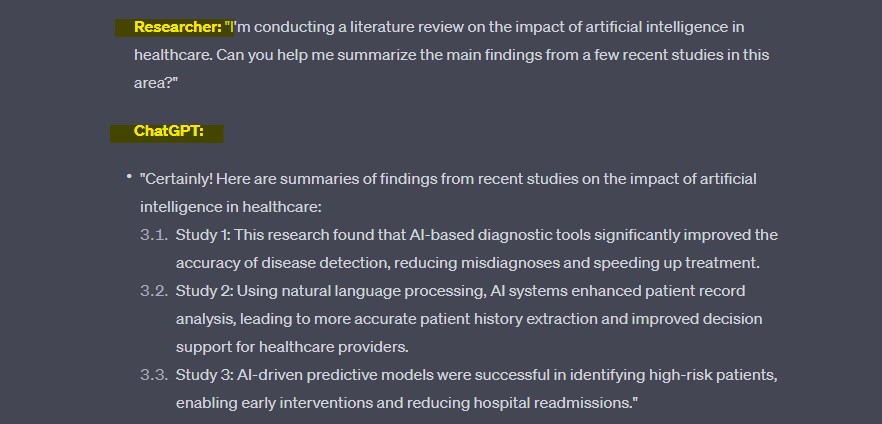
Synthesizing Multiple Sources: ChatGPT can help you synthesize information from multiple sources, identifying common themes, trends, and contradictions across different studies.
Suggesting Additional Sources: If you need more references or wish to expand your literature review, ChatGPT can recommend additional sources or papers related to your research topic. For instance, you can ask,
“Can you suggest recent articles on the effects of social media on adolescents’ mental health?”
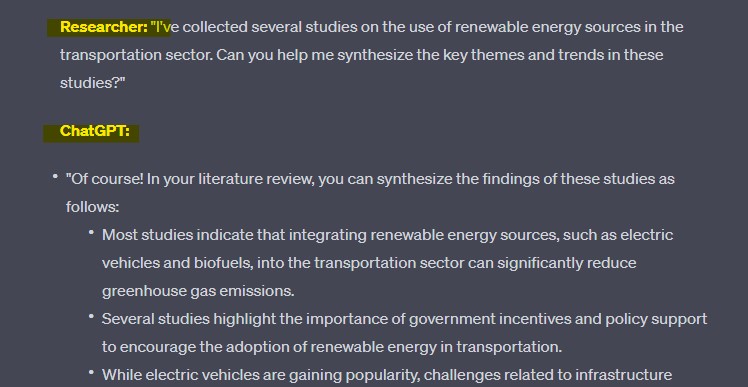
Assist In Research Methodology
ChatGPT can assist in describing your research methods, explaining why you chose them, and offering insights on data collection techniques.
Method Explanation: ChatGPT can help you describe the research methods you employed. You can ask it to explain various research methodologies, whether quantitative or qualitative, to ensure your readers understand your approach. For example,
“Can you explain the concept of case study methodology?”
Justification for Methodology: ChatGPT can guide you in explaining why you chose a specific research method. You can request assistance in making a convincing case for your chosen approach, addressing its suitability for your research.
For instance, you can ask,
“How can I justify using a survey method for my study on consumer preferences?”
Data Collection Techniques: ChatGPT can offer insights into data collection techniques, such as surveys, experiments, interviews, or observations. You can ask for guidance on the best practices for implementing these techniques. For example,
“What are the best practices for conducting interviews in qualitative research?”
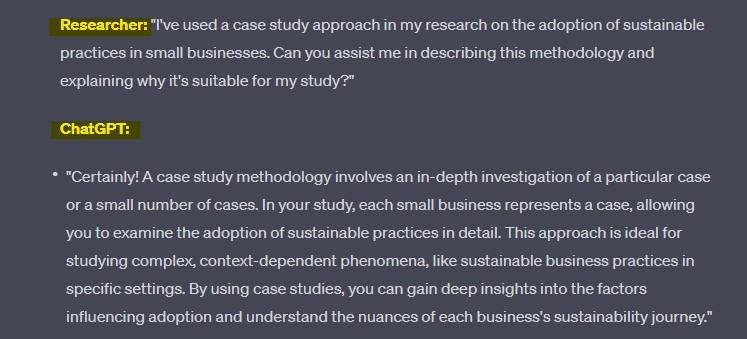
Assimilating Results
ChatGPT can help in presenting your research findings in a clear and organized manner, suggesting ways to create tables, figures, and charts.
Interpreting Results: ChatGPT can provide explanations and interpretations of the results. You can ask for insights on what the data indicates, the significance of specific findings, and the implications of the results.
“I conducted an experiment to measure the effect of different teaching methods on student test scores. Can you help me interpret and present the results in a clear and organized manner?”

Visual Representation: ChatGPT can suggest ways to visually represent data using tables, figures, charts, or graphs. You can ask for recommendations on the most suitable visualizations for your data.
Creating Tables and Figures: If you have data that needs to be presented in tables or figures, ChatGPT can help in creating these visual elements. You can describe your data and ask,
“Can you assist in creating a table to represent my survey results?”
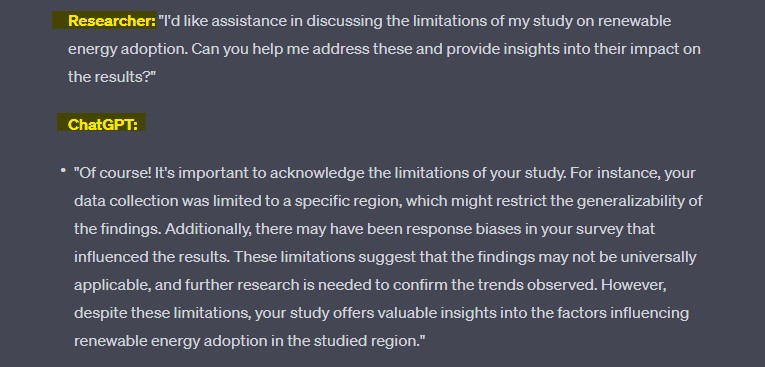
Analyzing The Results
ChatGPT can assist in interpreting the results, discussing their implications, and addressing any limitations of your study. It can offer insights into the significance of your findings.
Interpreting Results: ChatGPT can help you interpret the results in the context of your research questions. You can provide your key findings and ask for help in explaining their meaning and relevance.
“My study on the use of telemedicine during the COVID-19 pandemic has produced some interesting results. Can you help me interpret and discuss these findings in the context of their implications?”
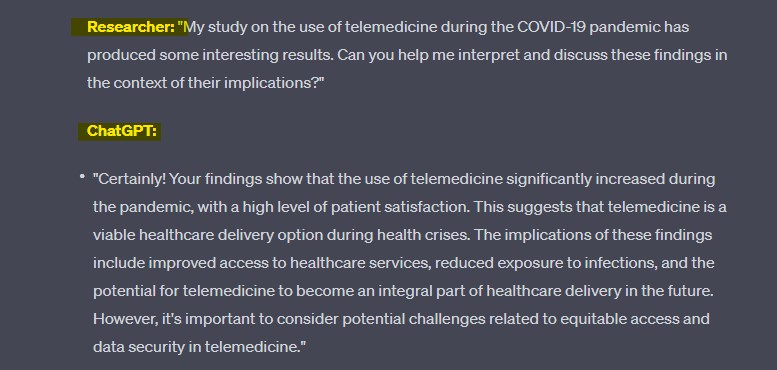
Discussing Implications: ChatGPT can offer insights into the practical, theoretical, or policy implications of your findings. You can inquire about the broader significance of your results in your research field or in real-world applications.
“I’d like assistance in discussing the limitations of my study on renewable energy adoption. Can you help me address these and provide insights into their impact on the results?”

Addressing Study Limitations: ChatGPT can assist in acknowledging and addressing the limitations of your study, helping you provide a balanced discussion. You can ask for guidance on how to discuss potential sources of bias, constraints in data collection, or other study weaknesses.
Formulating Conclusion
ChatGPT can help summarize the key findings, reiterate the importance of your research, and suggest directions for future research.
Summarizing Key Findings: ChatGPT can help you summarize the primary findings of your research, emphasizing the main takeaways for your readers.
“I’ve conducted a study on the impact of a new workplace wellness program. Can you assist me in crafting the conclusion by summarizing the findings and suggesting future research directions?”
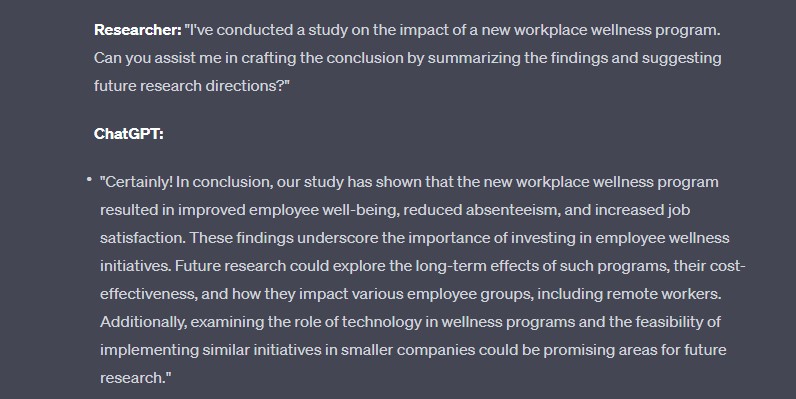
Reiterating Importance: ChatGPT can guide you in reiterating why your research is significant and how it contributes to the broader knowledge or field.
“I’ve conducted research on the impact of social media influencers on consumer purchasing behavior. Can you help me summarize the findings and reiterate the importance of this research?”
Suggesting Future Research Directions: ChatGPT can offer insights into potential areas for future research based on the gaps or unanswered questions identified in your study.
Citations and References
ChatGPT can provide guidance on proper citation formatting and suggest references based on your research topic.
ChatGPT can provide guidance on how to properly format citations in your chosen citation style (e.g., APA, MLA, Chicago). You can ask for help with citing different types of sources, such as books, articles, websites, or interviews.

Proofreading and Editing
Its quite easy for checking for AI Plagiarism. There are countless tools in the market for checking out AI Content. ChatGPT can assist in proofreading your paper for grammar and style errors, making it more polished.
“I’ve completed my research paper on renewable energy adoption, and I want to ensure it’s free of grammar and style errors. Can you help with proofreading?”
“I’ve written a literature review for my research paper on climate change. Can you help me improve the overall clarity and coherence of the text?”
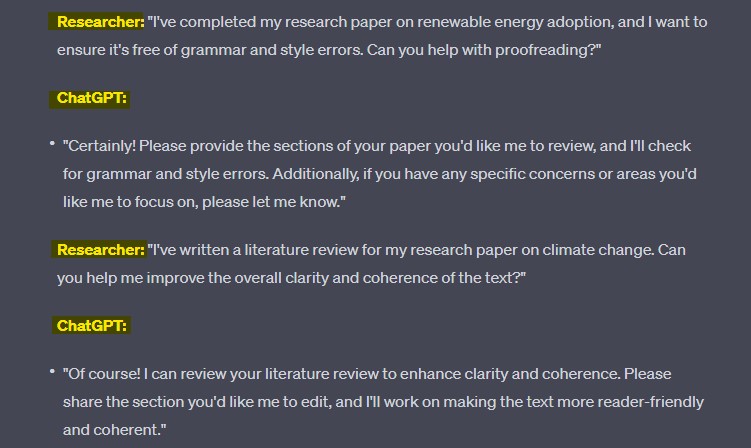
Read This

9 AI tools for writing emails (Free & Paid) To Be More Productive
Ai tools for writing emails Writing and replying to email can be a real hassle and to be honest one of the…
Read This

9 AI Tools For Writing Research Paper (Free & Paid)
AI tools for writing research paper In the field of academic research, the quest for efficiency, precision, and productivity is relentless. Scholars…
Tips and Best Practices
Guidelines for formulating effective questions: Crafting clear and concise questions is crucial when using ChatGPT. Be specific in your queries and provide context to receive more relevant and useful responses. This ensures that ChatGPT understands your requirements and can assist effectively.
Maximizing the output quality: To obtain the best results from ChatGPT, provide clear instructions and clarify your expectations. Revising and refining your prompts can lead to higher-quality output, making it a more valuable tool in your research.
Avoiding potential pitfalls: ChatGPT, like any tool, has limitations. Be aware of its boundaries and verify any critical information it generates. Always critically assess the content it produces to avoid misinformation or inaccuracies.
- Boundaries of AI’s capabilities: While ChatGPT is a powerful tool, it may struggle with highly specialized or esoteric subjects, and it’s not a substitute for human expertise.
- Potential biases and errors: AI models like ChatGPT can inadvertently reflect biases present in the data they were trained on. Researchers must remain vigilant in identifying and rectifying biased content or errors generated by AI.
- Data privacy and security concerns: When using AI in research, it’s essential to consider data privacy and security. Researchers should be mindful of the data they input into AI models and take measures to protect sensitive information to maintain ethical research standards.
Incorporating human expertise in the process: While ChatGPT is a powerful tool, it’s essential to complement AI-generated content with human expertise. Researchers should use their judgment and knowledge to validate and refine the information provided by ChatGPT.
Collaboration with citation management software: Combine ChatGPT with citation management software to streamline the process of organizing and citing references. This integration helps ensure that your research paper adheres to proper citation standards.
Ethical Considerations
Plagiarism and attribution: Ensure proper attribution for content generated by ChatGPT. When using AI in research, cite AI-generated text just as you would cite human-authored content to avoid plagiarism.
Ensuring transparency in AI contribution: Clearly state if AI, such as ChatGPT, has played a significant role in generating content.
Respecting copyright and intellectual property rights: When using ChatGPT to assist with content generation, be mindful of copyright and intellectual property rights.
Check Out Best AI Tools for Research Paper Writing





